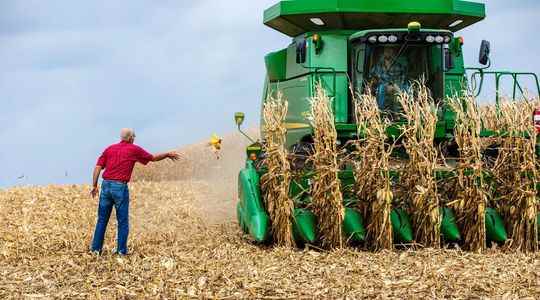The ongoing fighting on Ukrainian soil have caused the sudden stoppage of agricultural operations, interrupted the maneuvers of commercial ships and now raise the specter of a world shortage of several foodstuffs. Among the foods most affected: wheat. Russia being a big exporter, Ukraine too. Invaded, the country can no longer supply its trading partners. The supply is scarce.
The price of cereals, already particularly high before the invasion of Ukraine by the Russian army, is climbing. Wheat reached a record price of 393 euros on Friday March 4 – it was 284 euros in November. This increase should affect other consumer products and prices should soar, announce several economists. Philippe Crevel, specialist in macroeconomic issues and director of the Circle of Savings, explains how food balances could be turned upside down if the war lasts. According to him, consumers will be the first affected by these upheavals.
L’Express: How to explain that the war in Ukraine leads to such an immediate and direct increase in foodstuffs such as wheat?
Philippe Crevel: The rain of missiles and the fighting on the ground led, in fact, to the cessation of operations. This is the case for wheat, of which Ukraine and Russia are the main exporters. And the Ukrainian war has reinforced a phenomenon already at work for several months: supply is weaker than demand in the grain sector.
The season had been good in Ukraine and Russia, and the industry relied in part on these harvests. Most of the production for the year 2021 had already been harvested, sold and exported. There remains a part which is not. The difficulty now is the delivery of crops still stored in Ukraine and Russia, which cannot, for the time being, leave the territories. In a speculative logic, prices will in fact continue to grow. And this price increase affects consumers in all countries. They are the ones who pay the price.
Does this price increase have stronger repercussions on certain economies?
It must be understood that the food problem linked to the war in Ukraine affects above all the emerging countries. The problem is not so much European or French: it mainly affects the Maghreb countries and Brazil, which are very dependent on Ukrainian and Russian imports. Faced with skyrocketing cereal prices, countries like Algeria, Egypt and Mauritania are suffering. Farmers feed their animals with cereals used as inputs. And the rise in cost inevitably leads to additional costs for professionals, which are reflected in food prices.
This inflation can have repercussions on accessibility to meat and lead to social inequalities. As a result, the war in Ukraine, through food, can have political and social repercussions in African countries, poor countries in Asia or in the Maghreb. It must be remembered that the uprisings of arab spring in the early 2010s had their origins in the explosion in the prices of everyday resources.
Why does this problem weigh less on Europe?
Prices will rise, but the effects should be limited. Firstly because there are countries in Europe with high cereal production, such as France. A production that also has room for development. Moreover, with the European sanctions imposed on Russia since the annexation of Crimea, Europe gets little supplies from Moscow. The agricultural powers should therefore see the effect being limited to price increases that the consumer will have to bear.
The World Food Program (WFP) warned on March 4 of the risk of widespread famine. Does this scenario seem improbable to you?
In Europe, the repercussions will be felt above all on prices. And food imbalances are not only attributable to a question of income. There is no factor that leads one to think of major disruptions in accessibility or dietary imbalances.
In developing countries, however, it is a risk. One only has to observe the way in which some of these states want to heal their trade relationship with Russia by having refrained from supporting the United Nations resolution aimed at condemning the Russian invasion.
Developing countries could establish a rapprochement with Russia. Moscow has been trying to redirect some of its food exports since its invasion of Ukraine. Countries like Morocco, dependent on inputs, could therefore strengthen their ties with Russia. In other words, a reconfiguration of international trade is looming.
